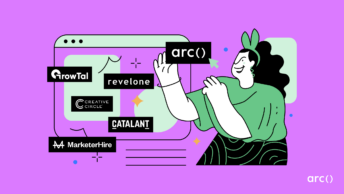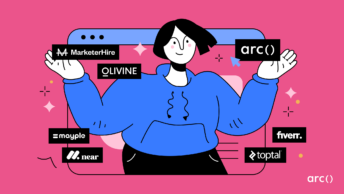60% of startup founders said that it was harder to recruit talent in 2018 than the year before, according to First Round Review’s State of Startups in 2018.
Hiring developers is no different, and perhaps even more difficult to hire than other roles. If you want to secure the best talent for your development team or project, the market has become increasingly competitive. Of course, it’s always possible to find a cheaper, mediocre developer, but that’s a risky decision. The trade-off is that your project may run late, the code written may end up being of subpar quality, and the list goes on.
The really good developers — those who have outstanding portfolios, have impressive work experiences, etc. — often get unsolicited job offers. Even if they’re a contractor or a freelance developer looking for their next gig, they may already have seen dozens of lackluster project proposals or, someone else in your space wants to hire them.
Using the pitching and negotiation strategies below can help maximize your chances of success when it comes to hiring a great developer. Before we get into the 7 key steps, be sure you already know what you need before hiring a developer.
Looking for top talent fast? See how Arc can help you:
⚡️ Find developers, designers, marketers, and more
⚡️ Freelance or full-time remote + fully vetted
⚡️ Save up to 80% with global hires
Hire top talent with Arc risk-free →
Preparing Your Pitch
1. Understand Your Market
The first step to preparing a pitch is to know your market. Whether you’re working on a new feature or a new product, show the prospective developer that you have done solid market research. Doing so will show that your idea stands on a concrete foundation.
Market validation is essential in building trust with the developer. Great developers want to have some level of assurance that they’re working on a project that fulfills a market need.
You can do market research by analyzing your competitors. This involves seeing what products they have and what solutions they push to solve problems similar to yours.
Afterward, show how your product is different. You can take several angles here. Show how it will fulfill the market need better than the competition or show how it addresses a different need that the competition is forgetting about.
You can also get in touch with potential customers to discover market gaps and untouched areas to expand in. If you can show that there will be customers for your solution, that is going to be a big help in showing the developer the prospects of your product.
Read More: 10+ Software Engineer Interview Questions to Find Top Dev Candidates
2. Know Your Project
When pitching your job opportunity, you need to show the prospective developer you know your project in-depth. Developers love to see that you have a clear plan in place, are passionate about the project, and can answer any questions that they have.
If you want to create a new product, the best way to do this is by outlining a proof of concept and a prototype. You should consider 4 key documents that will help you understand and communicate your project: wireframes, project requirements, workflow, and a list of essential features/functionality.
3. Prepare a Budget You’re Willing to Spend
You must establish a figure, based on your budget, for how much you’re willing to pay for the developer. If you want to hire a contractor or a freelance developer, you can use this tool to find the hourly rates that developers charge depending on their expertise, experience, and location. Doing this can help you in two ways.
First of all, you’ll know, based on your budget, what kind of developer you can hire. By proposing fair market rates, you will appear as an honest employer who understands the market. This will increase the trust between you and the developer, and make the interview process tilt in your favor.
Read More: 13 Things Freelance Software Developers HATE Hearing From Clients
4. Outline How You’ll Build & Iterate Your Product
Another amazing thing to have apart from market validation is developing a plan for a Minimum Viable Product (MVP). You should combine this with an outline showing how you will test and develop the product at the same time. This can give your developer an idea of how development work will mix in with market adaptation.
Developing an MVP will help you identify if there is a product-market fit. In turn, this will help you make the necessary development decisions along the way.
You can also try Arc, your shortcut to the world’s best remote talent:
⚡️ Access 450,000 top developers, designers, and marketers
⚡️ Vetted and ready to interview
⚡️ Freelance or full-time
Try Arc and hire top talent now →
Negotiation Strategies for the Developer Interview
5. Begin by Building Trust & Rapport
Building trust and rapport is essential to getting great results from the negotiation process. People are more open and willing to collaborate with employers who they feel they can trust. This can help you gather information, which can be crucial to making sure you get a deal on your terms.
A great tactic to use in building empathy is mirroring their language. This involves repeating the key 2-4 words they have just said in your response. Follow up with a pause while you wait for an answer. This helps ease any tensions and encourages the developer to expand on the topic.
When you notice that they are expressing emotion or passion for something during the conversation, you can encourage it by labeling it. For example, saying “It seems that you’re really enthusiastic about the algorithms involved in this project”. This helps them feel understood.
Another way to build trust is to admit any negatives of the project up-front. This makes you appear like an honest counterpart, which actually increases the likelihood of a successful outcome.
Read More: 8 Signs Your Freelance Developer Isn’t Working Out & What To Do About It
6. Make Them Feel in Control
Nobody likes working for overly controlling managers. So it’s essential to make your management style clear up front. This is especially true if you’re hiring freelance developers who value their independence.
A great way to make them feel in control during the interview is by using questions to guide the conversation. This will help the developers feel at ease and understand that you value their point of view.
Questions also allow you to subtly set the agenda and terms of discussion while allowing the other party to feel it is their idea. The best questions to ask are questions that require thinking to answer – avoid asking merely for facts.
Another quick tip is this: don’t allow “no”. People feel more comfortable when they answer a question negatively. Take this as an opportunity to make them feel in control and think outside the box for other ways to make the deal work.
7. Make Use of Non-monetary Terms
Last but not least, you should discuss the non-monetary aspects of the deal. If you don’t bring up any non-monetary items, the developer may not feel as comfortable accepting your offer.
From in-house developers to remote and freelance developers, having non-monetary terms that they really care about can help seal the deal – such as flexibility, ability to work on side projects, potential to learn new tech stacks, and so on. You can also tell them that they will be able to enhance their technical and non-technical expertise by working on a challenging project. For freelancers, make sure you set clear expectations on their working hours so they can keep their flexibility.
Letting developers know that you value their priorities is a great way to build trust, and help convince the developer to join your team or work on your project.
Remember: it’s not just about the money. Great developers care much more about doing relevant, meaningful work, maintaining their flexibility, and learning more. Make sure you bring this up during the interview process and make your stance clear to them.
Read More: Contract to Hire: The Flexible Remote Engineering Team Scaling Solution
Wrap Up
We hope that following these steps to preparing your pitch and negotiating will help you hire the perfect developer. Make sure you do your due diligence prior to the interview and come prepared. It’s best to create a series of tactics that you can use during the interview when the right time comes.
Don’t forget that pitching your project may be difficult at first, but using the tactics above will enable you to successfully navigate the situation.
If you want to find out more about hiring vetted developers for your team, learn more about Arc. Our developers go through multiple rounds of interviews and tests before you interview them to help speed up your hiring process.
Do you have any other tips? Let us know in the comments section below!
You can also try Arc, your shortcut to the world’s best remote talent:
⚡️ Access 450,000 top developers, designers, and marketers
⚡️ Vetted and ready to interview
⚡️ Freelance or full-time








